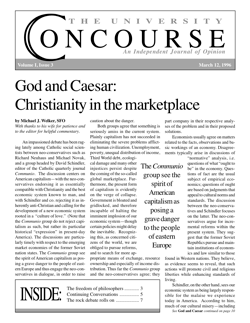Orthodox not paradox
by Kathleen van Schaijik
The March 1 issue of the National Catholic Reporter ran an article on Franciscan University by Robert J. McGlory, who spent three days here in January. Many familiar with the NCR were pleasantly surprised by the obvious attempt at objectivity. There was no mockery, no muck-raking, no interviewing of bitter and disillusioned alumni, no allegations of cult-like activity or insinuating references to covenant communities. Instead, he quotes Cardinal O’Connor and others praising the University, and faithfully describes the attractiveness of the campus, the oft-packed chapel, the orthodox theology and the religious sincerity of staff and students.
Still, the usual annoying slants are not entirely absent. McGlory calls FUS “an intriguing blend of paradoxes.” He is never quite explicit about what he means, beyond describing its unique “mixture of old and new” elements of Catholic culture (e.g. a “pre-Second Vatican Council” “level of reverence” at Mass mixed with “post-Vatican II” guitar music.) But a general impression comes through clearly enough, which goes something like this: How strange and inexplicable that a university featuring theology so “heavy on official teaching,” so “light on speculation” and so “empty of dissent” could be so thriving and prosperous! How paradoxical that a place so oppressively orthodox should be so full of bright, contented people!
You can hardly blame the writer for his befuddlement. To those raised on relativism and accustomed to identifying academic freedom with religious skepticism, the prospect of the cheerful, unhesitating submission to Church authority typical of our members must be alarming. The fact that a student who “after prayer and deliberation, still cannot accept a particular church teaching, such as the exclusion of women from ordination” would find herself in the minority here seems ominous- reminiscent of Orwell’s 1984 or Percy’s Thanatos Syndrome. For those of us, however, who “live and move and have our being” in orthodoxy, there is no mystery. We understand intuitively that doctrinal boundaries no more restrict our minds than the exclusion of poison restricts our diet. We can dismiss McGlory’s dark hints as the unfortunate bias of someone who “knows not whereof he speaks.”
But, if we do this too facilely, I think we will miss something worth examining in his description of our University. He notes in one place some faculty members saying “many students arrive at the school so trusting that they have to be prodded to ask questions or think critically.” Having been just this sort of student myself and having observed many others in the same condition, I would have to say this is a fair charge. Growing up in devout families, hemmed in on every side by the irreligion, immorality and rebellion that have characterized so much of the “Catholic scene” in recent decades, it is easy to develop a too-simplistic “good guys vs. bad guys” view of the Church-Charles Curran, Hans Kueng and especially the feminists being among the “bad guys;” the Pope, the Franciscan TORs, and the FUS faculty being among the “good guys.” There is certainly something to this. Scripture bears out the view of the religious life as a fierce battle between powers and principalities, with everyone lining up (consciously or not) on one side or the other. And there is an often-obvious distinction between people who fight for the Church and people who fight against it.
Nevertheless, as soon as we start thinking that whatever the good guys say is true and whatever the bad guys say is false; as soon as we stop examining ideas, and automatically disregard not just the errors, but the concerns and developments of the modern world; we are justly accused of a failure of critical thinking and a dogmatical spirit unbefitting any adults, but particularly those engaged in intellectual pursuits. I understand the temptation to be this way. The professors here are generally so admirable and trustworthy. And, surrounded as we are by people who agree in all the fundamentals, it is easy to become lazy intellectually, and leave the serious thinking to others. Let us not give in to it; let us resist the tendency to replace critical thinking with a dogmatical habit unworthy of university students. And let us be humble in accepting legitimate criticism, even when it comes from so unlikely a place as the National Catholic Reporter.
Kathleen van Schaijik


